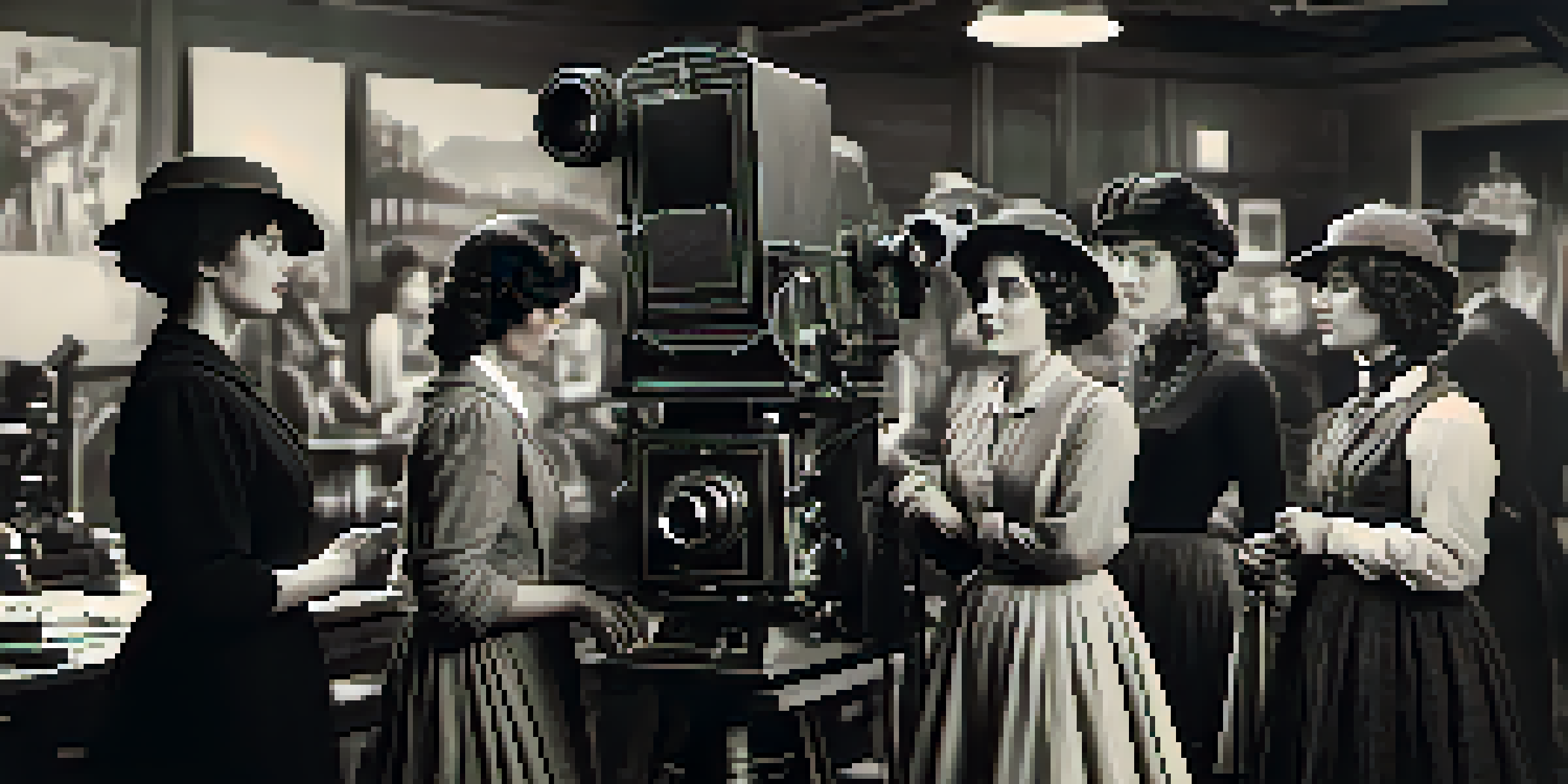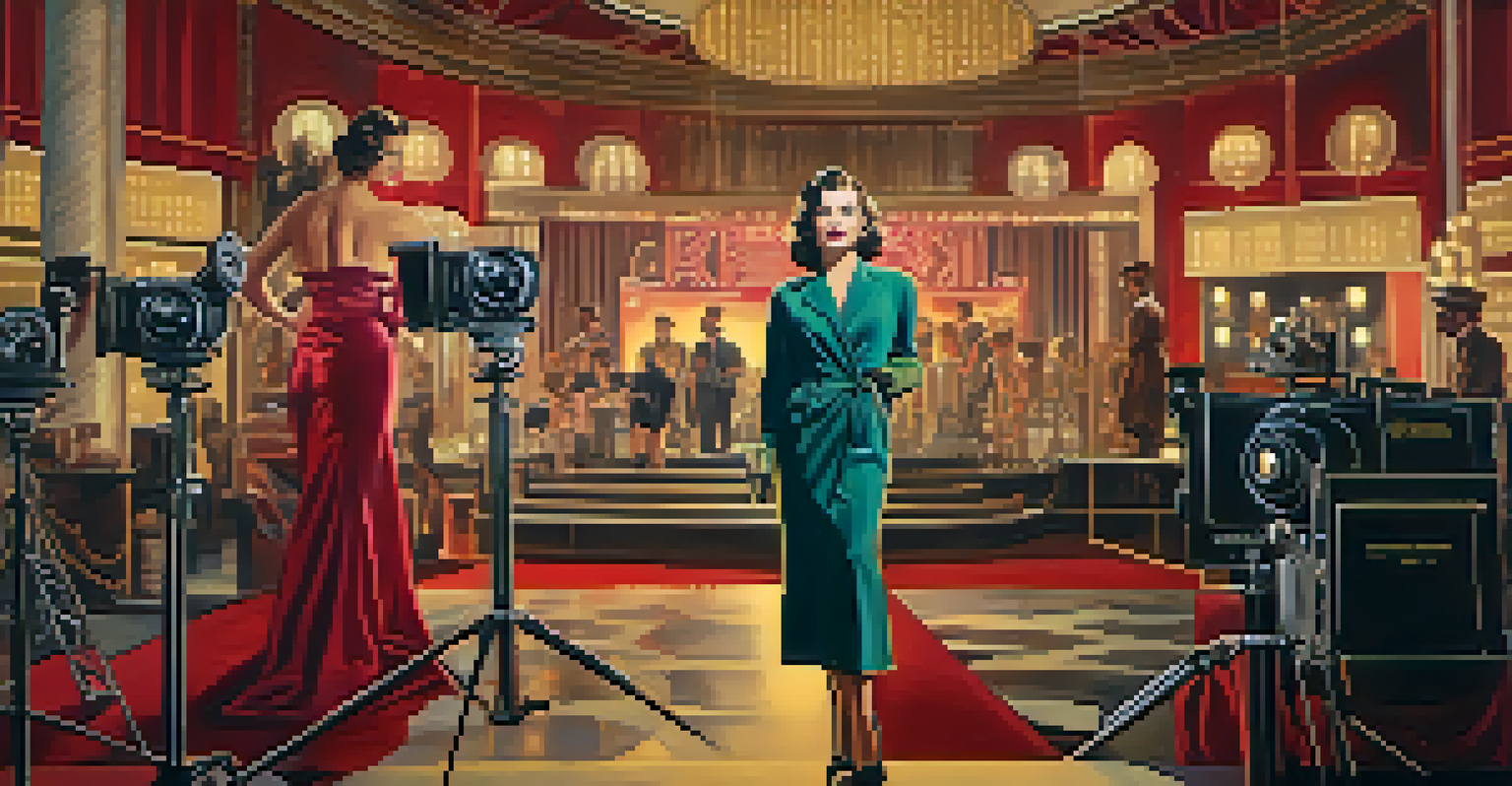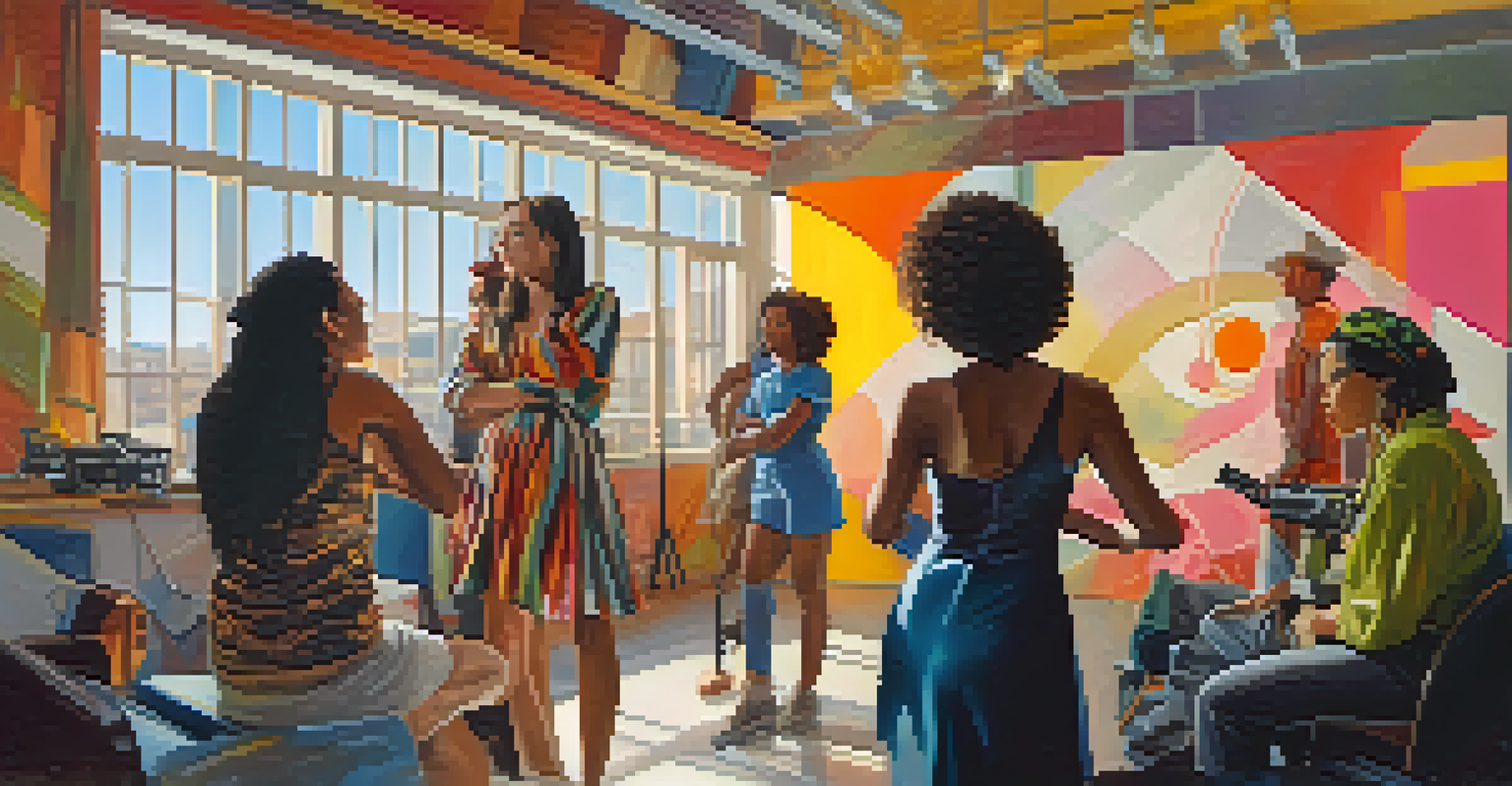From Silent Films to Blockbusters: Women in Cinematic History

The Early Days: Women Behind the Camera
In the silent film era, women were not just actresses; they were pioneers. Directors like Alice Guy-Blaché made significant contributions, creating narratives that challenged societal norms. Her work, often overlooked, laid the groundwork for future filmmakers and showcased women's unique storytelling perspectives.
Women are not just the supporting characters in the story; they are the storytellers and the directors of their own narratives.
Women also played crucial roles as screenwriters and editors, shaping the films we know and love today. Their influence extended beyond the screen, as they fought for recognition in a male-dominated industry. This early involvement proved that women were not only capable but essential to the evolution of cinema.
As the industry transitioned to sound films, these trailblazers continued to push boundaries, proving that their creative vision was just as powerful. Their legacy opened doors for future generations, inspiring women to pursue careers in film.
The Golden Age: Stars and Innovators
The Golden Age of Hollywood brought an array of talented women to the forefront, both in front of and behind the camera. Actresses like Bette Davis and Katharine Hepburn not only dazzled audiences but also demanded creative control over their roles. Their strong personalities helped redefine what it meant to be a leading lady in a time when women were often typecast.

During this era, women also began to take on important roles as producers and directors, with names like Ida Lupino breaking through barriers. Lupino's work as a director showcased her ability to tackle complex themes, making her a role model for aspiring female filmmakers. She proved that women's stories deserved to be told.
Pioneering Women Shaped Cinema
From the silent film era to modern blockbusters, women have played crucial roles behind and in front of the camera, influencing the evolution of storytelling in film.
As the film industry evolved, these women paved the way for future stars and creators, emphasizing the importance of diverse narratives. Their contributions helped shape the cinematic landscape, making it more inclusive and representative of women's experiences.
The Rise of Television and New Opportunities
With the advent of television in the 1950s, new opportunities emerged for women in the entertainment industry. Women began to take on roles as writers, producers, and directors in this new medium, creating content that resonated with diverse audiences. Shows like 'The Mary Tyler Moore Show' featured strong female leads, changing the portrayal of women on screen.
I’m not going to say that women are better than men, but I will say that we are not less than men.
This era also saw the emergence of women in genres traditionally dominated by men, such as action and drama. Creators like Mary Ellen Mark and showrunners like Shonda Rhimes redefined storytelling, showing that women could helm gripping narratives. Their work challenged stereotypes and opened doors for future female creators.
As television grew in popularity, women found a new platform to express their creativity and influence culture. This shift laid the groundwork for the powerful female voices we see on screen today, showcasing the importance of representation in all forms of media.
The Independent Film Movement: A New Wave of Voices
The 1990s marked the rise of independent films, creating a vibrant space for women filmmakers to thrive. Directors like Sofia Coppola and Julie Dash brought fresh perspectives and stories that resonated with audiences. Their innovative approaches demonstrated the power of independent cinema to challenge mainstream narratives.
Independent films often tackled complex themes related to identity, culture, and feminism, allowing women to explore their unique experiences. This movement provided a platform for diverse voices, leading to a richer cinematic landscape. The success of these films proved that audiences were hungry for stories that reflected a variety of perspectives.
Independent Films Amplify Voices
The rise of independent cinema in the 1990s provided a platform for female filmmakers to explore diverse narratives and challenge mainstream perspectives.
As the independent film movement gained traction, it inspired a new generation of female filmmakers. Their courage to tell authentic stories encouraged young women to pursue careers in the industry, fostering a sense of community and collaboration among creators.
Modern Blockbusters: Women in Leading Roles
Today, women are stepping into leading roles in blockbuster films, both in front of and behind the camera. Directors like Patty Jenkins and Ava DuVernay are breaking box office records, proving that female-led stories can resonate with audiences globally. Their successes highlight the importance of representation in mainstream cinema.
Moreover, actresses like Gal Gadot and Viola Davis are not only captivating audiences but also advocating for greater diversity in Hollywood. Their influence extends beyond their roles, as they use their platforms to promote change within the industry. This shift signifies a growing recognition of women's contributions to cinema.
As we see more women in key positions, the future of film looks promising. The increase in female-led projects reflects a broader cultural shift towards inclusivity and equality, paving the way for stories that resonate with everyone.
Challenging Stereotypes: Women in Diverse Roles
In recent years, the film industry has made strides in challenging traditional stereotypes about women. We're witnessing a broader range of characters, from strong heroines to complex anti-heroes, showcasing the multifaceted nature of female identity. This shift allows women to explore roles that were once deemed unsuitable.
Films like 'Black Panther' and 'Wonder Woman' have not only redefined the superhero genre but also provided powerful role models for young girls. These characters empower women and encourage them to pursue their dreams, proving that strength comes in various forms. The impact of these films extends beyond entertainment, inspiring real-world conversations about gender equality.
Future Looks Bright for Women Filmmakers
With growing initiatives for gender equality and the rise of streaming platforms, women in film are set to continue expanding their influence and representation.
As the industry continues to evolve, the portrayal of women in diverse roles will remain essential. It’s crucial for filmmakers to tell authentic stories that reflect the complexities of women's experiences, ensuring that future generations see themselves represented on screen.
Looking Ahead: The Future of Women in Film
As we look to the future, the role of women in film continues to expand and evolve. Initiatives aimed at promoting gender equality in Hollywood are gaining momentum, fostering an environment where female voices are amplified. This shift is vital for creating a more inclusive industry that values diverse storytelling.
Emerging platforms like streaming services provide unique opportunities for women filmmakers to showcase their work. With fewer barriers to entry, we’re seeing a surge of innovative content that reflects a broader spectrum of experiences. This change is crucial for nurturing new talent and diverse narratives.

The future of women in cinema is bright, but it requires ongoing support and commitment from the industry. By championing female creators and their stories, we can ensure that the legacy of women in film continues to thrive for generations to come.